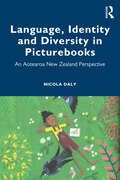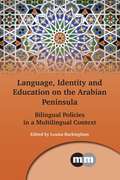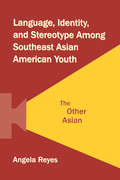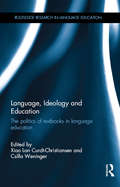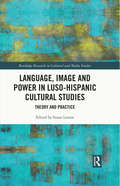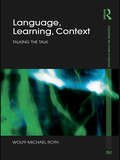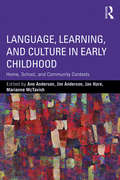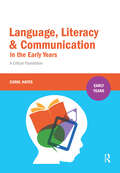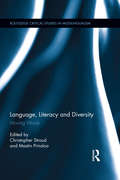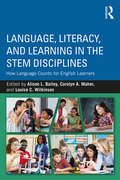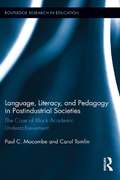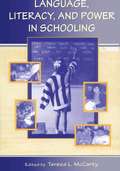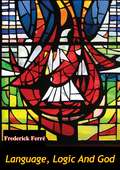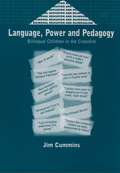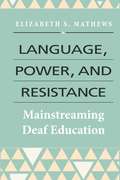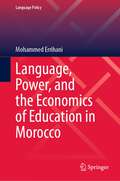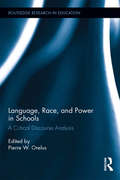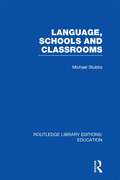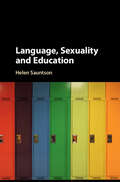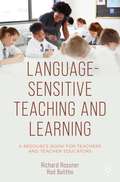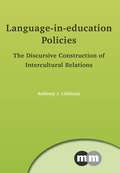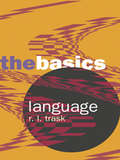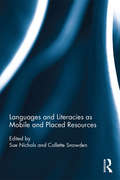- Table View
- List View
Language, Identity and Diversity in Picturebooks: An Aotearoa New Zealand Perspective
by Nicola DalyThis book presents a range of perspectives on the way language, diversity, and identity are reflected in New Zealand children’s literature, based on the published research of Nicola Daly, an associate professor in the Division of Education of the University of Waikato, and her colleagues.The book is organised into two sections. The first section examines the use of Te Reo Māori and English in the text of New Zealand picturebooks, exploring the linguistic landscape of Māori-English bilingual picturebooks. The second section, The Pedagogical Potential of Picturebooks, explores how picturebooks featuring Māori, English, New Zealand Sign Language (NZSL), and Pacific languages reflect identity and support diversity in society. Research from several educational contexts, ranging from kindergarten to university, where picturebooks are used to support learning language and learning about language is also discussed. Themes of language, identity, and diversity are explored throughout the two sections and brought together in the concluding chapter’s discussion of the power of picturebooks.This book will be of interest to scholars in children’s literature and education; it may also be relevant to scholars in linguistics library and information studies, cultural studies, and media and communication studies.
Language, Identity and Education on the Arabian Peninsula: Bilingual Policies in a Multilingual Context
by Louisa BuckinghamThis collection examines the urban multilingual realities of inhabitants of the Arabian Peninsula in the early 21st century from the perspectives of learners, teachers and researchers. Focusing on both public and private spheres, it considers the importance of both English and immigrants' languages in a context of rapid socioeconomic development. Extending beyond English-Arabic societal bilingualism, the language practices of the Peninsula's citizens and residents serve multiple purposes in their daily lived realities. Chapters on home and heritage languages, identity, ELT, commercial signage and academic publishing contribute to a deepening understanding of the inherent linguistic diversity in these dynamic societies.
Language, Identity, and Stereotype Among Southeast Asian American Youth: The Other Asian
by Angela ReyesThis book—an ethnographic and discourse analytic study of an after-school video-making project for 1.5- and second-generation Southeast Asian American teenagers—explores the relationships among stereotype, identity, and ethnicity that emerge in this informal educational setting. Working from a unique theoretical foundation that combines linguistic anthropology, Asian American studies, and education, and using rigorous linguistic anthropological tools to closely examine video- and audio- recorded interactions gathered during the video-making project (in which teen participants learned the skills for creating their own video and adult staff learned to respect and value the local knowledge of youth), the author builds a compelling link between micro-level uses of language and macro-level discourses of identity, race, ethnicity, and culture. In this study of the ways in which teens draw on and play with circulating stereotypes of the self and the other, Reyes uniquely illustrates how individuals can reappropriate stereotypes of their ethnic group as a resource to position themselves and others in interactionally meaningful ways, to accomplish new social actions, and to assign new meanings to stereotypes. This is an important book for academics and students in sociolinguistics, linguistic anthropology, discourse analysis, and applied linguistics with an interest in issues of youth, race, and ethnicity, and/or educational settings, and will also be of interest to readers in the fields of education, Asian American studies, social psychology, and sociology.
Language, Ideology and Education: The politics of textbooks in language education (Routledge Research in Language Education)
by Csilla Weninger Xiao Lan Curdt-ChristiansenThis book examines the role textbooks play in the teaching of dominant and non-dominant (first and foreign) languages in a range of cultural contexts worldwide. Each chapter addresses important issues related to what constitutes "legitimate knowledge", the politics of learning materials, global cultural awareness, competing ideologies, and the development of multilingual literacies. Language, Ideology and Education: The Politics of Textbooks in Language Education comprehensively surveys theoretical perspectives and methodological issues in the critical examination of language textbooks. In particular, it looks at: The Cultural Politics of Language Textbooks in the Era of Globalization The Politics of Instructional Materials for English for Young Learners Ideological Tensions and Contradictions in Lower Primary English Teaching Materials in Singapore Creating a Multilingual/multicultural Space in Japanese EFL: A Critical Analysis of Discursive Practices within a New Language Education Policy The book is primarily addressed to those who teach and research in the areas of Foreign Language Education, TESOL, Applied Linguistics, Language Policy, Critical Pedagogy, and Textual Cultures. Although the book is focused on textbook and materials analysis, rather than evaluation, most chapters discuss implications for curriculum design and materials development and therefore will be relevant to scholars working in those fields.
Language, Image and Power in Luso-Hispanic Cultural Studies: Theory and Practice (Routledge Research in Cultural and Media Studies)
by Susan LarsonThis volume explores the history, evolution, and future of Luso-Hispanic Cultural Studies as a discipline, a pedagogical tool, and a set of working practices by bringing together a diverse group of renowned specialists to examine how the field has grown out of and radically reconsidered some of the basic premises of British Cultural Studies since the 1950s to address the many cultures of the Spanish and Portuguese-speaking world. The chapters in this volume address How Cultural Studies is being practiced in the increasingly virtual mediascapes of the twenty-first century What happens to basic critical assumptions about culture and power after they have passed through the filter of Post-Colonial and Decolonial Studies of the Luso-Hispanic world How we understand the role of culture in light of recent experiences with radical demographic shifts, populism and civil unrest within Latin America, Iberian and the Latino U.S How new ways of practising Luso-Hispanic Cultural Studies have worked their way into our pedagogy and the structure of the curriculum in the age of the increasingly privatized neoliberal university Providing keen insight and reflection on these questions, this volume is an essential read for scholars and students of Visual and Film Studies, Latin American and Iberian Studies, Luso-Brazilian Studies, Language and Culture Pedagogy, Global Studies, and for anyone interested in Cultural Studies across the Luso-Hispanic world.
Language, Learning, Context: Talking the Talk (Foundations and Futures of Education)
by Wolff-Michael RothIn what way do educators understand the language they use to make sense of the educational environment? How does language enable educators and how can they consciously make the most of its potential? Using the right language and setting the correct tone in the school classroom has repercussions for all involved; whether it affects the linguistic development of a student or the effective delivery of a lesson, language plays an important factor in any educational context. As such, this innovative book focuses right at the heart of learning, arguing that current theories of speech in classrooms do not, and cannot, capture the essentially passive aspects of talking. Until now, these verbal and physical expressions of communication have been left untheorised, leaving the potential of an entire secondary area of language untapped. Exploring his argument along three clear, but interrelated lines of investigation, the author focuses on our understanding, on language itself and finally on communication. Thus he argues: that language is unintentional and our understanding of it is limited as soon as we speak, language appears beyond us in a highly singular, situated context that communication cannot be reduced to the simple production of words. Building on the work of linguistic philosophers such as Martin Heidegger, Donald Davidson, Paul Ricœur and Jacques Derrida, these salient points are further elaborated to fully develop the relationship between thinking and talk in educational settings. This invaluable book makes recommendations for the praxis of teaching and will appeal to students, researchers, and practising science and mathematics teachers, as well as those with interests in language and literacy.
Language, Learning, and Culture in Early Childhood: Home, School, and Community Contexts
by Ann Anderson Jim Anderson Jan Hare Marianne McTavishComplex factors affect young children and their families in today’s increasingly diverse world characterized by globalization, the transnational movement of people, and neo-liberal government policies in western and industrialized countries. This book focuses on three of these factors—culture, language and learning—and how they affect children’s development and learning in the context of their communities, families and schools. Taking an ecological perspective, it challenges normative and hegemonic views of young children’s language, literacy and numeracy development and offers examples of demonstrated educational practices that acknowledge and build on the knowledge that children develop and learn in culturally specific ways in their homes and communities. The authors highlight issues and perspectives that are particular to Indigenous people who have been subjected to centuries of assimilationist and colonialist policies and practices, and the importance of first or home language maintenance and its cognitive, cultural, economic, psychological and social benefits. Links are provided to a package of audio-video resources (http://blogs.ubc.ca/intersectionworkshop/) including key note speeches and interviews with leading international scholars, and a collection of vignettes from the workshop from which this volume was produced .
Language, Literacy and Communication in the Early Years: A critical foundation (Early Years)
by Carol HayesThis book guides students and practitioners through the wealth of information on cognition and language development by breaking the area down into manageable chunks and drawing these together into a full understanding of the holistic nature of child development. Children with communication difficulties are at risk of poor outcomes educationally, socially and in employability. Whilst there may be a range of interventions which can help children, it is the practice of those working with them that is the key to success. Therefore a firm understanding of communication development and the ability to adapt teaching to support children’s individual needs are vital.The text offers a balanced approach to the theories and research into the development and acquisition of language and literacy in the early years. It examines how practice can be improved and the impact that language and literacy development has on learning outcomes. It also, importantly, addresses the particular pedagogy related to bilingual and multilingual learners. Carefully structured activities are provided and the text clearly relates theory to practice. Pedagogical features encourage a questioning, challenging and reflective approach, promoting critical thinking throughout.
Language, Literacy and Diversity: Moving Words (Routledge Critical Studies in Multilingualism)
by Mastin Prinsloo Christopher StroudLanguage, Literacy and Diversity brings together researchers who are leading the innovative and important re-theorization of language and literacy in relation to social mobility, multilingualism and globalization. The volume examines local and global flows of people, language and literacy in relation to social practice; the role (and nature) of boundary maintenance or disruption in global, transnational and translocal contexts; and the lived experiences of individuals on the front lines of global, transnational and translocal processes. The contributors pay attention to the dynamics of multilingualism in located settings and the social and personal management of multilingualism in socially stratified and ethnically plural social settings. Together, they offer ground-breaking research on language practices and documentary practices as regards to access, selection, social mobility and gate-keeping processes in a range of settings across several continents: Africa, Asia, the Americas and Europe.
Language, Literacy, and Learning in the STEM Disciplines: How Language Counts for English Learners
by Carolyn A. Maher Alison L. Bailey Louise C. WilkinsonWith a focus on what mathematics and science educators need to know about academic language used in the STEM disciplines, this book critically synthesizes the current knowledge base on language challenges inherent to learning mathematics and science, with particular attention to the unique issues for English learners. These key questions are addressed: When and how do students develop mastery of the language registers unique to mathematics and to the sciences? How do teachers use assessment as evidence of student learning for both accountability and instructional purposes? Orienting each chapter with a research review and drawing out important Focus Points, chapter authors examine the obstacles to and latest ideas for improving STEM literacy, and discuss implications for future research and practice.
Language, Literacy, and Pedagogy in Postindustrial Societies: The Case of Black Academic Underachievement (Routledge Research in Education #91)
by Paul C. Mocombe Carol TomlinIn postindustrial economies such as the United States and Great Britain, the black/white achievement gap is perpetuated by an emphasis on language and language skills, with which black American and black British-Caribbean youths often struggle. This work analyzes the nature of educational pedagogy in the contemporary capitalist world-system under American hegemony. Mocombe and Tomlin interpret the role of education as an institutional or ideological apparatus for capitalist domination, and examine the sociolinguistic means or pedagogies by which global and local social actors are educated within the capitalist world-system to serve the needs of capital; i.e., capital accumulation. Two specific case studies, one in the United States and one in the United Kingdom, are utilized to demonstrate how contemporary educational emphasis on language and literacy parallels the organization of work and contributes to the debate on academic underachievement of black students vis-a-vis their white and Asian counterparts.
Language, Literacy, and Power in Schooling
by Teresa L. McCartyLanguage, Literacy, and Power in Schooling brings critical ethnographic perspectives to bear on language, literacy, and power in culturally and linguistically diverse contexts, showing how literacy and schooling are negotiated by children and adults and how schooling becomes a key site of struggle over whose knowledge, discourses, and literacy practices "count." Part I examines tensions between the local and the general in literacy development and use; Part II considers face-to-face interactions surrounding literacy practices in ethnically diverse classrooms; and Part III widens the ethnographic lens to position literacy practices in the context of globalization and contemporary education policies. Each section includes a substantive introduction by the editor and a synthetic commentary by a leading literacy researcher.Above all, this is a book oriented toward social action. Unpacking the complexity of literacy practices and experiences in diverse settings, the authors seek not only to build new knowledge, but to inform and transform the pedagogies and policies that limit human potentials. The chapters in this volume have much to teach us about the roots of inequality and the possibilities for positive change. Together, they highlight the urgent need for critical literacy researchers to engage politically, confronting education policies that deny the rich multiplicity of human literacies, thereby carving ever-deeper cleavages between those with and without access to literacies of power.The dual focus on language and literacy with critical-ethnographic accounts of identity and schooling speaks to a growing constituency of scholars and practitioners concerned with the role of literacy and discourse in alternatively affirming or negating knowledge, power, and identity, both within and outside of schools.
Language, Literacy, and Technology
by Richard KernFrom the origins of writing to today's computer-mediated communication, material technologies shape how we read and write, how we construe and share knowledge, and ultimately how we understand ourselves in relation to the world. However, communication technologies are themselves designed in particular social and cultural contexts and their use is adapted in creative ways by individuals. In this book, Richard Kern explores how technology matters to language and the ways in which we use it. Kern reveals how material, social and individual resources interact in the design of textual meaning, and how that interaction plays out across contexts of communication, different situations of technological mediation, and different moments in time. Showing how people have adapted visual forms to various media as well as to social needs, this study culminates in five fundamental principles to guide language and literacy education in a period of rapid technological and social change.
Language, Logic And God
by Frederick Ferré"THIS BOOK is an attempt to fill the present striking need for an introduction to contemporary linguistic philosophy as it bears on theological discourse. Wherever I have gone, recently, among educated Christians in Britain and America, I have encountered profound curiosity--and a good deal of anxiety--concerning modern methods in philosophy as they relate to the logical nature and validity of theological affirmations. Similarly I have found many of my students in contemporary philosophy and in the philosophy of religion becoming deeply absorbed in the issues raised by a critical examination of theological speech. From both groups, the intellectually alert Christians and the thoughtful graduate and undergraduate students of philosophy and religion, I have been heavily bombarded with appeals for direction to some book which would (1) set forth the central issues and arguments concerning theological discourse for readers who have familiarity with traditional philosophy but who are relatively untrained in contemporary philosophical practices and (2) place into perspective the present state of philosophical and theological discussion in this area of burgeoning interest. To my frustration, I have had to answer such requests with the admission that no such book exists and with the promise that I would try, some day, to provide that book myself. In preparing this volume, therefore, I have done my best to keep those promises in mind."
Language, Power and Pedagogy
by Jim CumminsPopulation mobility is at an all-time high in human history. One result of this unprecedented movement of peoples around the world is that in many school systems monolingual and monocultural students are the exception rather than the rule, particularly in urban areas. This shift in demographic realities entails enormous challenges for educators and policy-makers. What do teachers need to know in order to teach effectively in linguistically and culturally diverse contexts? How long does it take second language learners to acquire proficiency in the language of school instruction? What are the differences between attaining conversational fluency in everyday contexts and developing proficiency in the language registers required for academic success? What adjustments do we need to make in curriculum, instruction and assessment to ensure that second-language learners understand what is being taught and are assessed in a fair and equitable manner? How long do we need to wait before including second-language learners in high-stakes national examinations and assessments? What role (if any) should be accorded students' first language in the curriculum? Do bilingual education programs work well for poor children from minority-language backgrounds or should they be reserved only for middle-class children from the majority or dominant group? In addressing these issues, this volume focuses not only on issues of language learning and teaching but also highlights the ways in which power relations in the wider society affect patterns of teacher-student interaction in the classroom. Effective instruction will inevitably challenge patterns of coercive power relations in both school and society.
Language, Power, and Resistance: Mainstreaming Deaf Education
by Elizabeth S. MathewsThe current policy of educating d/Deaf and h/Hard of hearing (DHH) students in a mainstream setting, rather than in the segregated environments of deaf schools, has been portrayed as a positive step forward in creating greater equality for DHH students. In Language, Power, and Resistance, Elizabeth S. Mathews explores this claim through qualitative research with DHH children in the Republic of Ireland, their families, their teachers, and their experiences of the education system. While sensitive to the historical context of deaf education, Mathews focuses on the contemporary education system and the ways in which the mainstreaming agenda fits into larger discussions about the classification, treatment, and normalization of DHH children. The research upon which this book is based examined the implications that mainstreaming has for the tensions between the hegemonic medical model of deafness and the social model of Deafness. This volume explores how different types of power are used in the deaf education system to establish, maintain, and also resist medical views of deafness. Mathews frames this discussion as one of power relations across parents, children, and professionals working within the system. She looks at how various forms of power are used to influence decisions, to resist decisions, and to shape the structure and delivery of deaf education. The author’s findings are a significant contribution to the debates on inclusive education for DHH students and will resonate in myriad social and geographic contexts.
Language, Power, and the Economics of Education in Morocco (Language Policy #35)
by Mohammed ErrihaniThis volume provides a comprehensive understanding and assessment of language policy in education in Morocco. All aspects related to language policy and the effect on the education sector for more than half a century in Morocco are included in the book. The book traces the role that the linguistic medium has played in the educational system in Morocco since its independence from the French in 1956. It examines the role that various language policies have played in the educational sector and provides an in-depth analysis of the most recent language policy recognizing Berber, making it an official language and a mandatory subject in all schools. As such, this book is on the cutting edge of language policy as it also examines a policy that is still being rolled out.It also addresses the role of political pressure, and social and political conflict on language policy in Morocco, and how the linguistic medium has failed to guarantee the basic goals of equity, equality and social justice that assure a decent future for every citizen.
Language, Race, and Power in Schools: A Critical Discourse Analysis (Routledge Research in Education)
by Pierre W. OrelusIn this edited collection, authors from various academic, cultural, racial, linguistic, and personal backgrounds use critical discourse analysis as a conceptual framework and method to examine social inequities, identity issues, and linguistic discrimination faced by historically oppressed groups in schools and society. Language, Race, and Power in Schools unravels the ways and degrees to which these groups have faced and resisted oppression, and draws on critical discourse analysis to examine how multiple forms of oppression intersect. This volume interrogates areas of discrimination and injustice and discusses possibilities of developing coalitions and concerted efforts across the lines of diversity.
Language, Schools and Classrooms (Routledge Library Editions: Education)
by Michael StubbsThe role of language is central in education – but there is much debate about the exact relation between children’s language and their educational success. The author provides a clear guide to the basic issues in the debates over language deficit, standard English and classroom language, and in this edition he shows how work in sociolinguistics can give a better understanding of the place of language in education and society.
Language, Sexuality and Education
by Helen SauntsonPresenting a range of data obtained from secondary schools in the UK and US, this path-breaking book explores the role played by language in constructing sexual identities. Analysing the often complex ways in which homophobia, heterosexism and heteronormativity are enacted within school contexts, it shows that by analysing language, we can discover much about how educators and students experience sexual diversity in their schools, how sexual identities are constructed through language, and how different statuses are ascribed to different sexual identities.
Language, Youth and Identity in the 21st Century
by Jacomine Nortier Bente A. SvendsenThe language of young people is central in sociolinguistic research, as it is seen to be innovative and a primary source of knowledge about linguistic change and the role of language. This volume brings together a team of leading scholars to explore and compare linguistic practices of young people in multilingual urban spaces, with analyses ranging from grammar to ideology. It includes fascinating examples from cities in Europe, Africa, Canada and the US to demonstrate how young people express their identities through language, for example in hip-hop lyrics and new social media. This is the first book to cover the topic from a globally diverse perspective, and it investigates how linguistic practices across different communities intersect with age, ethnicity, gender and class. In doing so it shows commonalities and differences in how young people experience, act and relate to the contemporary social, cultural and linguistic complexity of the twenty-first century.
Language-Sensitive Teaching and Learning: A Resource Book for Teachers and Teacher Educators
by Richard Rossner Rod BolithoThis textbook aims to raise teachers’ language awareness, to emphasise the importance of language and communication in enabling young people to reach their potential, and to develop their knowledge of how language and communication function in educational environments as well as outside. Laid out in a clear five-unit structure, and complemented by a range of classroom activities, reflective exercises, and case study examples from around the world, this book addresses the need for teachers to become more linguistically aware and sensitive in an accessible and reader-friendly way. It is an essential resource for pre-service and in-service teachers working with a range of age groups across the curriculum.
Language-in-education Policies
by Anthony J. LiddicoatThis book examines the ideological underpinnings of language-in-education policies that explicitly focus on adding a new language to the learners' existing repertoire. It examines policies for foreign languages, immigrant languages, indigenous languages and external language spread. Each of these contexts provides for different possible relationships between the language learner and the target language group and shows how in different polities different understandings influence how policy is designed. The book develops a theoretical account of language policies as discursive constructions of ideological positions and explicates how ideologies are developed through an examination of case studies from a range of countries. Each chapter in this book takes the form of a series of three in-depth case studies in which policies relating to a particular area of language-in-education policy are examined. Each case examines the language of policy texts from a critical perspective to deconstruct how intercultural relationships are projected.
Language: The Basics (The Basics)
by R.L. TraskWhat makes human language unique?Do women speak differently from men?Just what is the meaning of "meaning"?Language: The Basics provides a concise introduction to the study of language. Written in an engaging and entertaining style, it encourages the reader to think about the way language works. It features: * chapters on 'Language in Use', 'Attitudes to Language', 'Children and Language' and 'Language, Mind and Brain'* a section on sign language* a glossary of key terms* handy annotated guides to further reading.Providing an accessible overview of a fascinating subject, this is an essential book for all students and anyone who's ever been accused of splitting an infinitive.
Languages and Literacies as Mobile and Placed Resources
by Sue Nichols Collette SnowdenLanguages and Literacies as Mobile and Placed Resources explores how languages and literacies are implicated in the complex relationship between place and mobility. It is a book that represents the next wave in literacy studies in which theories of mobility, networking and globalisation have emerged to account for the dynamic landscape of globally circulating communication resources. Authors in this volume take up a more complex way of thinking about resources, applying it to consider languages and literacies as assemblages or as parts of assemblages that are involved in learning, teaching and meaning-making. The book addresses forms of text and mobility that arise in contexts outside of formal education including marketing, charity, journalism, community organisation and parenting. It also addresses school contexts and higher education settings. Key topics explored include: Consequences of workplace confinement Literacies as placed resources in the context of rural communities Literacy, sustainability and landscapes for learning Documenting networked knowledge on tablets Mobilising literacy policy through resources Global Englishes as placed resources Languages as contextualised resources Shaping a digital academic writing resource in a transcultural space With an international range of carefully chosen contributors, this book is a must read text for all academics interested in semiotics and literacy studies.
